Rise of an Empire - A Swedish AAR
- Thread starter Jaspume
- Start date
-
We have updated our Community Code of Conduct. Please read through the new rules for the forum that are an integral part of Paradox Interactive’s User Agreement.
You are using an out of date browser. It may not display this or other websites correctly.
You should upgrade or use an alternative browser.
You should upgrade or use an alternative browser.
The Time of Woes
Essen watched the decadent building burn. It was the end. Gustav and the council were dead, and the chance of a strong leader coming to the fore was ridiculously small, thanks to the large number of bickering nobles still remaining. With no-one to look to for strength, they would have to submit to his rule.
It was all falling into place.
---
After the execution of both Gustav and the Swedish Council, Sweden found itself in a deadly position. General Essen had gravely misjudged the situation; he had recieved support from the Teutonic Order, and used the wealth he recieved to bribe many of the nobles, landowners, generals and all the men of importance he could sway to his side. Unfortunately for Essen, when the time came for his 'allies' to pledge their support to him, he recieved far less than he intended.
To the north, Essen found his support. He managed to muster 10,000 men; 4,000 cavalry and 6,000 infantry. With the army still locked in battle to the south in Mecklenburg, most of these troops were merely peasantry. In truth, although Essen was convinced he had influence within the army, he hadn't. If the army had still been present in Sweden the collapse caused by Essen may never have occured. On the other hand, if Marshal Mirjam had been present he would have attended the meeting that had seen the death of the council, and no true 'higher authority' would have existed, for Mirjam was now the single remaining member of the council. The fact that there still remained a solid leader was largely the reason Essen recieved little support; many were uncertain Essen could truly achieve a total conquest of Sweden when the marshal still had considerable support. Essen strived for an isolationist Sweden, calling for the conquest of Scandinavia in his name. Once this was achieved, he proposed that Sweden should focus upon trade and should build a strong economy, caring little for the outside world.
A central band of territories, with their capital in Stockholm, remained loyal to Mirjam and to Gustav's vision of a Swedish empire. They wanted a seperation from the union, and they wanted an empire that could pose a threat to even the greatest of powers. They had 7,000 troops; 2,000 cavalry and 5,000 infantry, and once the army was aware of the situation arising in Sweden, this power had the support of the marshal as well. The Norwegian council supported the central power.
To the south, supporters of the Kalmar union arose, supported by the Danish king. They wished for a return to the old ways, to submission, and for Sweden to bow to it's true masters; the Danes. They pushed for the annexation of all Swedish territories to Denmark. This power was the
weakest in terms of both the economy and the military. They had a force of 4,000 men; all infantry. They would prove little threat to any power, but their efforts in the war were certainly noticed.
Finally, in the east, a new group was stirring. The Finns had created an independence movement, calling for the rise of a new, independent power, free from the ties of both Sweden and the union. With a force of 6,000 cavalry and 5,000 infantry, they held the strongest force of the four powers.
However, they were relatively peaceful and called for negotiations rather than warfare. They requested the release of all Finnish territories, allowing the formation of Finland. They were the weakest economically of the four factions, but they were in the strongest position.
The army, still involved in the Danish war to the south, pledged it's allegiance to the loyalists, as did the navy. This placed the loyalist faction in a strong position, but with three powers bearing down on Stockholm with frightening speed, and it's leader stuck in a foreign land, could the dream of an Imperial Sweden survive?
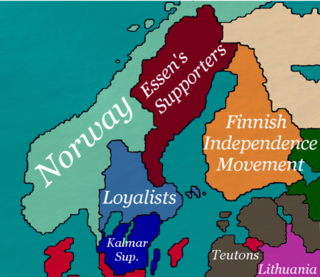
---
Just a quick update. It feels like I rambled quite a bit.
Sorry for the size of the writing and the picture, I resized it in Photbucket but it hasn't shown up on the forum. Still, better than nothing. Oh, and thanks to Snugglie (?) for the article in the AARlander on how to do the map, I really like it!
comagoosie: Yep. Sweden is going to be crippled for some years to come, even if the loyalists manage to unite the nation again.
Enewald: Ah, they're all useless anyways.
I shall be leaving for a holiday next Thursday and I'll be gone for 3 weeks of blissful rest and relaxation, so I'll try to get a few updates up before then.
Last edited:
Essen is how I play. I guess I have to switch sides and root for him!Essen strived for an isolationist Sweden, calling for the conquest of Scandinavia in his name. Once this was achieved, he proposed that Sweden should focus upon trade and should build a strong economy, caring little for the outside world.
Anyways, I don't see why the finns don't expand? You said it yourself they are the weakest economically but the strongest militarilly, which is a huge motive to go on a conquest spree. Further speculation shows that the loyalist has to be on the defensive as it surrounded by enemies, but they have the capital and the ships, not to mention highly expirienced troops in Germany. The Kalmar union, at first, seems like it would have to be on the defensive, but the opposite is true with having no enemies but to the north, they may freely move their troops north without having their homeland in danger. Essen is in the most dangerous of positions as he has to make a move or die, as I am sure that the Kalmar or the loyalist will let him live in peace.
This is getting interesting
Go Finns! 
Really, the area under Essens control is like only forests, the loyalists have forests and some lakes, and the kalmars have the people. :rofl:
Really, the area under Essens control is like only forests, the loyalists have forests and some lakes, and the kalmars have the people. :rofl:
comagoosie said:Essen is how I play. I guess I have to switch sides and root for him!
While they have the largest military, they will probably face the most pressure. The Teutons will be hitting them from the south, and Essen will be attacking from the north. They also face the threat of a loyalist landing, so they're potentially having to spread their military out to face three sides.comagoosie said:Anyways, I don't see why the finns don't expand? You said it yourself they are the weakest economically but the strongest militarilly, which is a huge motive to go on a conquest spree.
They're going to have a hard time just keeping the wolves at bay, and even if Essen is defeated they will still have to face the loyalists and the Teutons.
They will certainly have a hard time holding out until the army returns. They'll be going through some difficult times before Mirjam returns, but when he does, he'll be able to hit the Kalmar supporters from behind. As long as the loyalists can keep both Essen and the unionists away, they may have a chance.comagoosie said:Further speculation shows that the loyalist has to be on the defensive as it surrounded by enemies, but they have the capital and the ships, not to mention highly expirienced troops in Germany.
And with Danish support they certainly are in a strong position. I think they have the highest manpower, so they'll be more able to replace troops in a hurry than the other powers can. However, they'll have to take out the loyalists quickly and establish a defensive line against Essen, otherwise their forces will be tied to the north aganst the loyalists when Mirjam hits them from the south.comagoosie said:The Kalmar union, at first, seems like it would have to be on the defensive, but the opposite is true with having no enemies but to the north, they may freely move their troops north without having their homeland in danger.
While he himself is in a lot of danger due to the strong opposition he'll face from the east and the south (and, to a lesser extent, to the west), he does have the Teutons on his side. While the army is tied down in Mecklenburg, the Teutons will be free to move forces into Scandinavia with little fear of invasion. You're right, though. He will have to make a move quickly or face his end.comagoosie said:Essen is in the most dangerous of positions as he has to make a move or die, as I am sure that the Kalmar or the loyalist will let him live in peace.
Enewald said:Go Finns!
Really, the area under Essens control is like only forests, the loyalists have forests and some lakes, and the kalmars have the people. :rofl:
You're right, that's why Essen has to move quickly to gain some more beneficial land. He does have the Teutons, but still.
As for the loyalists, well, they have the army. They just have to hold out, which is going to be the hardest part.
No Time for Mourning
North Stockholm
A whisper of a breeze gently rustled the lush green leaves of the maple trees, silently standing sentinel over the graveyard. It was a relatively pleasant day; a few, wispy clouds drifted lazily across a cerulean sky. There was little noise; only the tinkling songs of a few blackbirds broke the silence.
A single figure stood over a grave; his greying, cropped hair bristling in the breeze. The soil appeared fresh, hinting that the grave was recently dug. The surrounding grass was short and trimmed, contrasting the sea of long, sweeping stalks of grass now dominating the area, the soft touch of the wind sending a wave of movement across the graveyard.
The man crouched down, tightly clutching a small package in his arms, his cloak wrapped tightly around him. His eyes were dark and his face weary; several nights of work had taken it's toll upon the man. He touched the soil delicately with one hand.
"You old fool," he whispered, a hint of a smile upon his face, "You never left that office, did you? You might have survived this if you'd got out once in a while." He withdrew his hand, then glanced at the headstone.
"Here lies Gustav Vasa," he read, "Father of Sweden." He smiled again, then withdrew his hand. He placed the package down upon the ground, his smile dissapearing as he laid out the contents of the package in front of the grave; a small book, several sheets of paper, and a small, silver crucifix held on a thin chain. The man skimmed through the papers, then looked up at the headstone once more.
"Do you truly believe this can be achieved?"
He remained silent for a moment, staring fixedly at the headstone as if waiting for an answer. None came. The wind rustled leaves, the bird's sang their songs and the world marched on. But there was no answer.
The man grunted a laugh, as if at himself, then returned his gaze to the items.
"With your death, the nation is in turmoil." The man continued, as if in conversation, "If it weren't for the greed of men we very well may be dead, but thankfully Essen recieved far less support than he imagined. He stays to the north, where few reside. Mirjam remains loyal to your vision, even with your passing. You've inspired a great deal of people." He shook his head with a smile. "I don't know how you managed it, but I think this dream of yours could go on. I shall have to keep these safe for a time, at least until this trouble has blown over. Then I'll give the plans to Mirjam."
He sighed, wrapping the contents back up in the cloth he had brought.
"Well my lord," he said, rising from his crouch, "I must leave you, it's dangerous to come this far north of Stockholm, even if it's within loyalist territory." A faint smile flickered upon his worn face, "Farewell old friend," he said, patting the headstone. "May we meet in a better place."
With that, Nils Torstennson turned and walked slowly from the graveyard, the items still held tightly in his grasp.

---
Gustav Vasa had brought much needed stability to Sweden during his rule. He encouraged the growth of the military, was well loved by the people, and gave the public hope for a better future. In particular, he kindled the dream of an independent Sweden, a dream that would soon grow into a roaring fire.
With his centralisation of a fairly disorganised council, he began to unite the nobility and forge a more unified future. The plans he had so feverishly worked upon during his life would aid the coming rulers of the realm, whoever they may be, down a path he had dreamt of for most of his days.
However, his death had now caused much harm to the nation. With the four factions so vehemently opposed to each other, Sweden would pay a great price for it's unification, no matter who won the war. The least damaging fate would be if the Loyalists pulled off a victory, but even then the costs both in materials and manpower, and not to mention to the economy and the people, would be dire.
Gustav Vasa had left quite the mark upon Sweden. It may not be the impact he had wished to have, however.
Last edited:
yay, Kustaa Vaasa is dead, finally freedom for us poor finns!
Or not, maybe av Essen becomes a tyrant.
Or not, maybe av Essen becomes a tyrant.
4 factions, each vying for sweden and their own goals. Each has its strength and weakneses. Each has something to gain, and each has something to lose.
Gah, I don't know what is going to happen and I don't like it
Gah, I don't know what is going to happen and I don't like it
Okay, just to show you all that I am indeed working (and right before I go on holiday too), here's a screenshot.
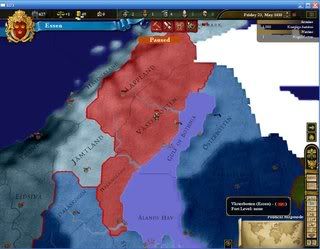
I still have to edit the military, advisors, generals, and I still need to make Essen the 'monarch', but I'm getting there. Just this one nation took nearly 45 minutes, and I've barely done anything.
Still, it'll get faster now I know what the hell I'm doing.
I decided to just call the nation 'Essen', because 'Essen's Supporter's' was taking too long to write, but now after seeing this;
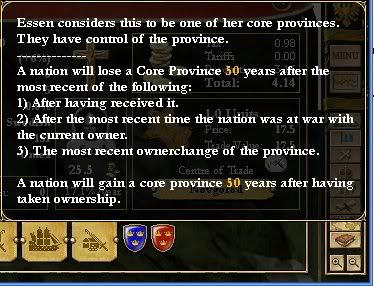 I may have to change it to something more fitting.
I may have to change it to something more fitting. 
I've still got to finish all the details on this nation, then add all the others in. Then after all that I've got plenty of events to write....
It's going to be a long couple of days.

I still have to edit the military, advisors, generals, and I still need to make Essen the 'monarch', but I'm getting there. Just this one nation took nearly 45 minutes, and I've barely done anything.
Still, it'll get faster now I know what the hell I'm doing.
I decided to just call the nation 'Essen', because 'Essen's Supporter's' was taking too long to write, but now after seeing this;

I've still got to finish all the details on this nation, then add all the others in. Then after all that I've got plenty of events to write....
It's going to be a long couple of days.
I didn't know you were actually creating a modification 
Sweet! And anyways, having essen called a girl is hilarious, but anyways can't you just copy and paste Essen's supporters and you will be good?
Sweet! And anyways, having essen called a girl is hilarious, but anyways can't you just copy and paste Essen's supporters and you will be good?
I just read through this AAR and damn, What a twist!
Looking forward to more when you will be done with the modding.
Looking forward to more when you will be done with the modding.
comagoosie: Copy and paste?....You appear to posess the logic I clearly lack.  I feel stupid now...
I feel stupid now...
Griffin.Gen: Thanks!
Force Change: It's my first time modding anything in the game, so hopefully it'll turn out to be a success...
Enewald: You may laugh now, but I don't think there's enough people there to challenge his rule anyway.
You may have noticed that updates have been rather scarce lately. This is due to the fact I've been away from my computer for several weeks, and as such, been unable to progress with the AAR.
Now I'm home however, work is in full swing again. Hopefully, the mod will be complete before Thursday (Exam results day ) and I can write up another segment of the story.
) and I can write up another segment of the story.
Untill then chaps, and thanks for the comments!
Griffin.Gen: Thanks!
Force Change: It's my first time modding anything in the game, so hopefully it'll turn out to be a success...
Enewald: You may laugh now, but I don't think there's enough people there to challenge his rule anyway.
You may have noticed that updates have been rather scarce lately. This is due to the fact I've been away from my computer for several weeks, and as such, been unable to progress with the AAR.
Now I'm home however, work is in full swing again. Hopefully, the mod will be complete before Thursday (Exam results day
Untill then chaps, and thanks for the comments!
Great I was having Essen withdrawals... 
Copy and Paste? Well that is better than what I know o
o
Copy and Paste? Well that is better than what I know
Well, this isn't a groundbreaking update, but it should at least cover the AAR until I'm entirely finished with the mod. (It's nothing special, I've just had little time to work on it over the holidays, so...)
I haven't wrote anything for a while, so I hope it's okay.
---
It was during the battle of Kurland that Konrad had first met General Essen. He had offered General Konrad his entire army to spare his own life, willingly signing his men to their deaths. That, perhaps, was what surprised the Teuton general the most. He had faced many foes on the battlefield; his many scars were evidence of that, and had learned to distance himself from the horrors of battle and, as a general, replace the lives of his men with numbers. His aim was to ensure he didn't lose too many men, and to make sure the enemy lost plenty of theirs. It was better that way.
But no matter how hard you try, signing over the deaths of 2,000 loyal soldiers isn't an easy thing to do. Essen, however, had done this with a casual smile, the Grand Master even engaging in frivolities with the man. It was this lack of compassion for his soldiers lives that made Konrad wary of his superior. If he was willing to give up the lives of his own people, how willing would he be to sign a Teutons life over? Konrad shook the thought from his head. It was better not to think about such things.
He had been assigned to the campaign by the Grand Master based upon his record, but Konrad could clearly see that his skills would not be enough to turn this situation around.
Essen had promised the eastern and north provinces, perhaps, he had ventured, Stockholm itself. As it had turned out, he had only secured the allegiance of the north; a few worthless provinces with little resources, few settlements and a temperature that could chill a man to the bone.
There was little in the way of manpower here, and Konrad couldn't see any possibility of success.
Essen, however, claimed the nation would fall within his grip in a mere 3 months.
Evidently, Konrad thought, the man was also mad.
---
"Just run that by me again, if you would."
The messenger looked nervously from the general to his officer, preparing himself for the inevitable fit of rage in which he would likely be the target of several deadly projectiles.
"Uh... P-...atrick...von..." he stuttered, transfixed by the general's fiery glare.
"Well? Spit it out then!"
"General Essen has murdered all members of the swedish council, except you, and has northern Sweden under his control." He stopped, wincing for a moment in case of a sudden blow. After a moment or two of silence, the quavering boy went on, "...The eastern provinces have rebelled, and are calling themselves 'The Republic of Finland', and the south has also rebelled in support of the Danish king. The central territories have declared you as their leader, and have named themselves 'The Loyalists'."
The boy stepped back hurriedly to avoid the generals blows, although surprisingly to the boy, none came.
"And when did you leave for here?"
The boy, somewhat unnerved by the sudden mood change, inched a little closer.
"A messenger arrived by boat, yesterday morning, sir. I ran as fast as I could from the coast, but it took about a day."
The general nodded solemnly.
"And do you know how long ago this rebellion actually took place?"
The boy shook his head nervously.
The general nodded, then ordered the boy out of the tent.
Marshal Mirjam stood quietly for a moment, then turned to his second in command.
"I want all available troops to disengage from the siege immediately. It's Denmarks problem now. Get them ready to march by Dawn. We march for Sweden when the sun rises."
Officer Johann nodded quietly, his short blond hair bristled with water from the downpour outside. A scar, fresh from the war with the Germans, ran from his eye down his cheek, blood occasionally seeping down his face. It added to his grim demeanour quite nicely.
"As you wish, sir." As he moved to leave the tent, he turned to look the pacing general. "I assume we are at war with all rebellious factions?"
Mirjam stopped his contemplative pacing for a moment, glancing at his trusted officer with an ominous smile.
"Naturally."
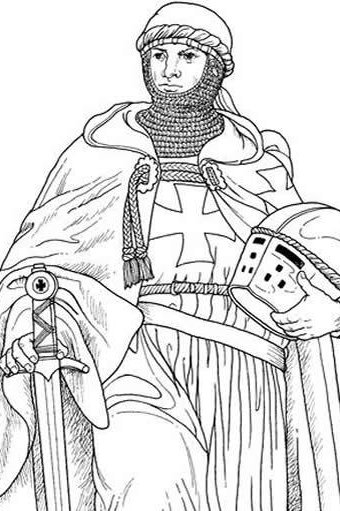
General Konrad, currently overseeing Teuton forces in Västerbotten.
I haven't wrote anything for a while, so I hope it's okay.
---
Monastic Support
Västerbotten
24th May 1406
24th May 1406
It was during the battle of Kurland that Konrad had first met General Essen. He had offered General Konrad his entire army to spare his own life, willingly signing his men to their deaths. That, perhaps, was what surprised the Teuton general the most. He had faced many foes on the battlefield; his many scars were evidence of that, and had learned to distance himself from the horrors of battle and, as a general, replace the lives of his men with numbers. His aim was to ensure he didn't lose too many men, and to make sure the enemy lost plenty of theirs. It was better that way.
But no matter how hard you try, signing over the deaths of 2,000 loyal soldiers isn't an easy thing to do. Essen, however, had done this with a casual smile, the Grand Master even engaging in frivolities with the man. It was this lack of compassion for his soldiers lives that made Konrad wary of his superior. If he was willing to give up the lives of his own people, how willing would he be to sign a Teutons life over? Konrad shook the thought from his head. It was better not to think about such things.
He had been assigned to the campaign by the Grand Master based upon his record, but Konrad could clearly see that his skills would not be enough to turn this situation around.
Essen had promised the eastern and north provinces, perhaps, he had ventured, Stockholm itself. As it had turned out, he had only secured the allegiance of the north; a few worthless provinces with little resources, few settlements and a temperature that could chill a man to the bone.
There was little in the way of manpower here, and Konrad couldn't see any possibility of success.
Essen, however, claimed the nation would fall within his grip in a mere 3 months.
Evidently, Konrad thought, the man was also mad.
---
Mecklenburg
25th May 1406
25th May 1406
"Just run that by me again, if you would."
The messenger looked nervously from the general to his officer, preparing himself for the inevitable fit of rage in which he would likely be the target of several deadly projectiles.
"Uh... P-...atrick...von..." he stuttered, transfixed by the general's fiery glare.
"Well? Spit it out then!"
"General Essen has murdered all members of the swedish council, except you, and has northern Sweden under his control." He stopped, wincing for a moment in case of a sudden blow. After a moment or two of silence, the quavering boy went on, "...The eastern provinces have rebelled, and are calling themselves 'The Republic of Finland', and the south has also rebelled in support of the Danish king. The central territories have declared you as their leader, and have named themselves 'The Loyalists'."
The boy stepped back hurriedly to avoid the generals blows, although surprisingly to the boy, none came.
"And when did you leave for here?"
The boy, somewhat unnerved by the sudden mood change, inched a little closer.
"A messenger arrived by boat, yesterday morning, sir. I ran as fast as I could from the coast, but it took about a day."
The general nodded solemnly.
"And do you know how long ago this rebellion actually took place?"
The boy shook his head nervously.
The general nodded, then ordered the boy out of the tent.
Marshal Mirjam stood quietly for a moment, then turned to his second in command.
"I want all available troops to disengage from the siege immediately. It's Denmarks problem now. Get them ready to march by Dawn. We march for Sweden when the sun rises."
Officer Johann nodded quietly, his short blond hair bristled with water from the downpour outside. A scar, fresh from the war with the Germans, ran from his eye down his cheek, blood occasionally seeping down his face. It added to his grim demeanour quite nicely.
"As you wish, sir." As he moved to leave the tent, he turned to look the pacing general. "I assume we are at war with all rebellious factions?"
Mirjam stopped his contemplative pacing for a moment, glancing at his trusted officer with an ominous smile.
"Naturally."

General Konrad, currently overseeing Teuton forces in Västerbotten.
Last edited:
Sealed In
26th May 1406
Mecklenburg
Mecklenburg
As an infant sun rose slowly in the pale morning sky, camp fires were doused, tents were hastily packed away and horses were led clumsily through the mess of half dressed, and in some cases dozy, soldiers. The shouts of superiors could be heard over the clanging of pots and pans, shields and weapons. The effect of their cries was alike to the crack of a whip, causing many a greenhorn to fumble in his duties.
The Grand Marshal stood upon a hillside, his sharp features highlighted by the newborn light as he gazed over the camp below. Several cries of shock heralded the arrival of a crisp easterly wind, sweeping away the canvas of a tent from grasping hands.
Mirjam sighed. The military wasn't the way it used to be.
Officer Johann approached the marshal tentatively, his presence punctuated by the clang of his iron cuirass.
"Sir, we've recieved another message from Stockholm."
Mirjam raised an eyebrow inquisitively.
"Oh? More rebels?"
"Not exactly sir, no. Essen has launched several raids across the Seperatist border into loyalist territories. It's believed he's already razed a large number of small towns and villages, although he appears to have withdrawn from loyalist lands for the time being."
Mirjam shrugged casually, "Is that all? It's hardly a surprise that-"
"That's not all sir, there have been sightings of Teutonic troops."
Mirjam fell silent, taking a moment to absorb the news. He returned his gaze to the mess of activity below and slowly began to redraw his plans.
"Then we have reason to believe the Teutons are aiding these rebels?"
Johann nodded, his expression grim. Both of them were veterans of several campaigns; they were no fools. A peasant rabble was one thing, but hardened troops such as those of the Order were quite another.
Mirjam sighed heavily, "Well, at least it can't get any worse."
Johann shuffled uncomfortably, "I'm afraid it just did..."
---
The Danish Straits
Øresund
A large Trading Cog travelling from Stockholm
Øresund
A large Trading Cog travelling from Stockholm
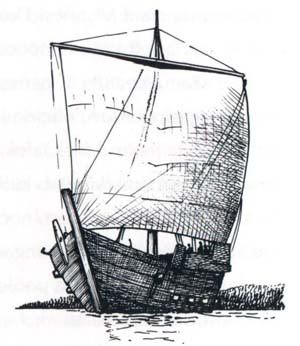
The salty sea air left a sharp taste in Captain Stefan's mouth, the gentle wind carrying the smell of a nearby fisherman's haul of fish as he heaved his catch on board.
Stefan had made the trip from Stockholm to Amsterdam countless times, carrying an assortment of goods and wares to and from the two cities. It had earned him a decent living, allowed him to afford a small crew and to buy his pride and joy, the Amarant.
He took in another gulp of the fresh sea air, listening to the ripple of the sail as it flapped in the wind. As hard a life as it was, there was nowhere he'd rather be than on the open sea.
"Ushkuiniks!"
Or maybe not.
The captain broke from his moment of self reflection and jumped to action, wheeling around to meet the cry. It was Fredrik.
"What was that!?"
Fredrik pointed toward the approaching Danish coast, ships bustling to and from the tolls. Unmistakably, in between the tolls and the Amarant, were several, large and foreboding, Russian ships. Each bore the symbol every seaman learnt to fear; pirates.
"Jump to! Get us the hell out of the way!"
He looked out at the Danish patrol ships and the two fortresses that towered above the Øresund, expecting to see fierce fighting.
There was none.
---
"Ah, our first catch of day."
The Russian grinned manically, his rotten teeth and wide eyes giving him a terrifying appearance.
"Just make sure you're men don't get any of the others. If the king hears of any fatalities beyond the Swedish he'll..."
The Russian waved a hand carelessly, "Do not worry, friend," he grinned again, "We are, how you say, professionals." He turned back to look out over the battlements of the Krogen. "My men know what they doing."
The Danish ambassador nodded reluctantly, averting his gaze from the Russian's manic stare. The Russian ships were closing in fast, and judging by the size of the vessel, the haul would be considerable.
"You realise my lord will want a share of the," he paused for a moment to search for the colloquial term, "...loot?"
The russian laughed heartily, spittle spraying over the battlements. "I'm sure we come to some agreement. We say... a fifth?"
The ambassador shook his head, "Two fifths."
A servant approached the rugged pirate cautiously, presenting a bottle of wine and a crystal glass. The expensive glass caught the Russian's eye in an instant.
"Ah..." The Russian smiled again, "It done. Pleasure do business. I hope our friendship last long time." At this he chuckled, bypassing the glass offered to him and downing several gulps from the bottle, wine dribbling into his short, matted beard.
The Danish ambassador barely managed a grimace.
"Quite."
---
Another update is coming...
Last edited:
Ushkuiniks
The ushkuiniks were Novgorodian pirates, modelling their lifestyles after that of the Vikings; fighting, murder and pillaging were all a daily fact of life for an ushkuinik. Encouraged by Teutonic ambassadors and supplied by Essen, these vicious pirates blocked off the channels of the Danish Straits to all loyalist vessels, effectively cutting off all trade and supply lines to the world outside the Baltic.
Although the Danish could not officially support such activities against the Swedish, it was clear that little effort was made to prevent the blockade.
---
The Danish Straits
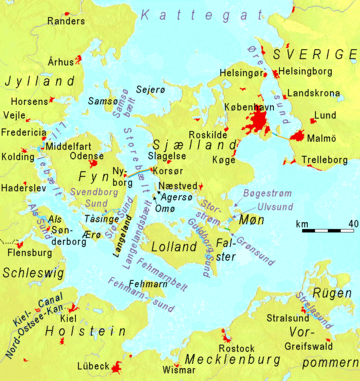
The 'Danish Straits' is comprised of three channels connecting the Baltic sea to the North Sea, leading ships through the Kattegat and the Skagerrak out into the North Sea. The three channels; 'Great Belt' (Storebælt), 'Little Belt' (Lillebælt) and 'Oresund' (Øresund) were strategically important to all Baltic nations throughout the 1400's and subsequent centuries.
Put simply, whoever controlled the Straits controlled the access of both merchant and martial vessels to the Baltic, and because of this, the Straits would become a point of great contention between Denmark and Sweden.
Strategically, it was the Øresund that would prove the most politically important of the three channels. Seperating the Danish island of Zealand (Sjælland) from the province of Scania, or Skåne in Swedish, it has a width of just 4km at it's narrowest point, but would become one of the busiest waterways in the world.
In the 1420's, near the town of Helsingør just off the north east coast of Zealand, the Danish king (Eric of Pommerania) ordered the construction of a fortress at the narrowest point of the Øresund. Named Krogen, this fortress enforced the Danish kings demand that all ships wishing to enter or leave the Baltic must pay to do so, regardless of it's departure location or destination. If a ship refused to pay the toll they were fired upon by cannons from Krogen and from Kernen, a large Danish fortress located in Helsingborg, Scania, constructed in the early 13th century.
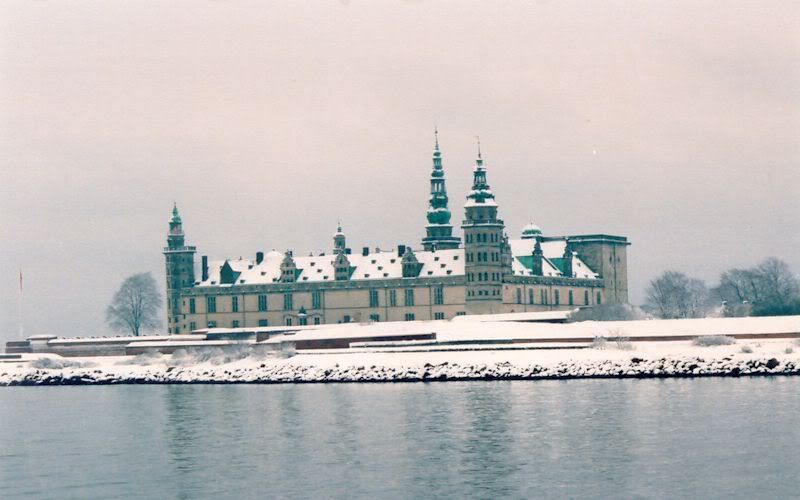
The Krogen, now known as the Kronborg Castle.
With this largely undisupted control over the channel, and with the expansion of the Krogen into the larger Kronborg castle in 1585 by Frederick II, the Danish held a large amount of power over access to the Baltic. Soon, to avoid aversion of the tolls, similar payments were collected at the other two channels, and in 1567, the tolls were raised even further, providing three times the revenue. It would provide the most important source of income to the Danish crown for several centuries.
In 1658 however, the submission of Danish lands on the Sandinavian peninsula caused a great loss of power over the channel. The tolls were eventually abolished in 1857, and all channels were made free to both military and commercial shipping.
---
Enewald: Mirjam is a slow, slow man.
Qorten: Thanks!

